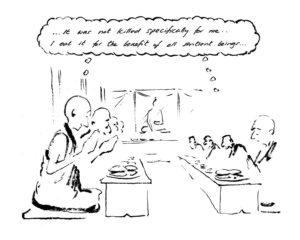Definition of the Week (30) – Enthusiasm
Lama Tsong Khapa:
“The nature of enthusiasm: Having focussed on the object of virtue, being in the aspect of strong joy.”
Briefly
Enthusiasm is joy in virtue. It is the antidote against laziness and has the function of perfectly accomplishing and completing one’s virtuous practice.
Elaborately
Definition: From the Compendium of Knowledge: What is enthusiasm? It is joy in regard to armor, training, confidence, not giving up and not being complacent.
Divisions:
- Armor-like enthusiasm is the enthusiasm that is generated prior to engaging into a virtuous action.
- Enthusiasm of training is the enthusiasm that accompanies the viruous practice.
- Enthusiasm of confidence is enthusiasm in one’s abilities. It lacks low self esteem and counteracts thoughts like, “How could somebody like me ever achieve this.”
- Irreversible enthusiasm is the enthusiasm that prevents one from being sidetracked by other virtuous activities before having completed what one originally set out to do.
- Enthusiasm of non-complacency is enthusiasm that protects one from being satisfied with an inferior or incomplete result.
For examples, some students are satisfied with just studying and implementing one small aspect of the path, and then think, “I have made great progress along the path.” When they then later receive teachings on the whole path to enlightenment by someone knowledgeable in all the important points of the path, then they become discouraged.
The Difference Between Enthusiasm and Effort:
Effort based on enthusiasm is joyous effort that helps to accomplish one’s aims quickly. Mere effort, on the other hand, is difficult to sustain over a long time period and is usually less effective. It is therefore important to cultivate a sense of happiness with one’s dharma practice.
Four Conducive Conditions for Enthusiasm:
- The power of belief: Generating aspiration for the practice of abandoning and adopting through meditating on the karmic laws of cause and effect.
- The power of stability: Not engaging into actions indiscriminately but first weighing up whether one can accomplish the action or not.
- The power of joy: Practicing joyful enthusiasm without contentment, like a child that does not want to stop playing.
- The power of desisting: Taking a break when body and mind have become exhausted through intense joyous effort and then immediately starting again when mental and physical strength are restored.
Short Meditation on Increasing Self-Confidence and a Positive Self-Image
Sit down comforably in an upright position.
Pick a time span such as today, last week, last year etc.
Remember consciously with a clear and relaxed mind, without judging, all the actions of body, speech and mind carried out in that period from the start up to the present moment.
Rejoice in all positve actions in general and dharma actions specifically, recalling also all their immense karmic benefits. (Most likely one finds more to recjoice in as one initially thinks).
Now focus inwards and identify your dharma qualities, such as love or compassion. (Find at least one.)
Rejoice in your qualities, ideally until the thought, “I am good,” is generated.
Repeat until the thought, “I am good,” is generated naturally.


